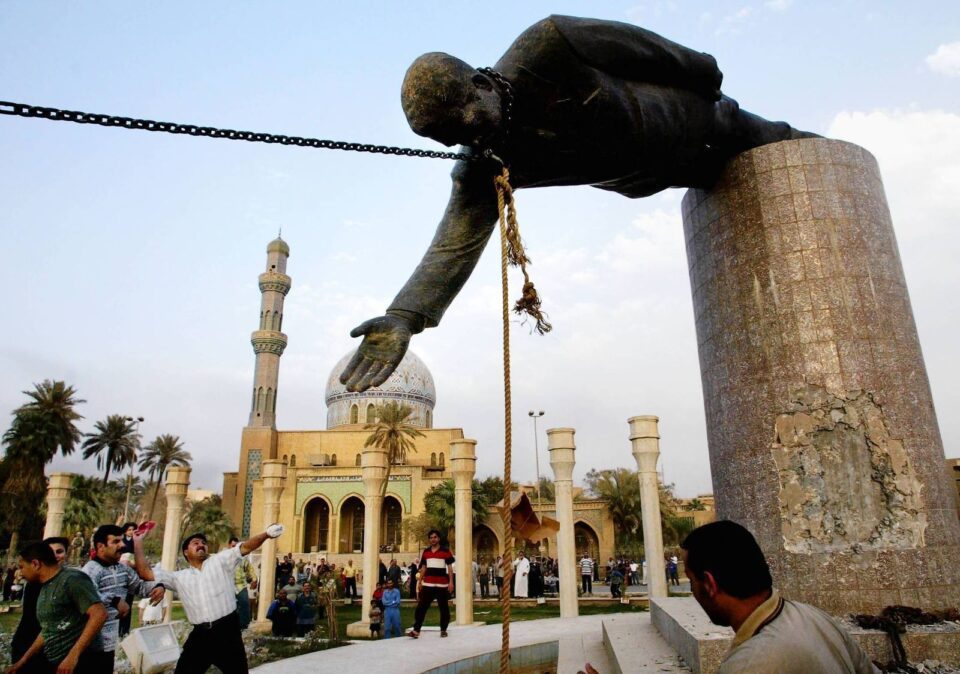Every year on April 9, Iraq marks the anniversary of the fall of the Ba’ath regime. This date, now 22 years past, symbolizes the end of a brutal dictatorship and the beginning of a new chapter for both Iraq and Kurdistan. For Kurdistan, it opened a new gateway to the world and an opportunity for reconstruction and progress.
In 2003, over 300,000 coalition soldiers participated in the Iraq War, with around 250,000 of them from the United States. following the U.S., the United Kingdom contributed the second-largest number of troops. The operation began with aerial bombardments on March 20, 2003, followed by a ground invasion. Within 21 days, Baghdad fell into the hands of coalition forces, and Saddam Hussein’s statue was toppled, signaling the end of decades of Ba’athist rule.
Shireen Abdulrahman Dino, a former Member of the Iraqi Parliament, told The Kurdish Globe: “The people of Kurdistan and Iraq had long awaited the fall of the dictatorship, hoping it would usher in peace, prosperity, and freedom for all under a federal, democratic constitution. But the experience of the new Iraqi federal state has been disappointing—centralized oppression continues in different forms. This was especially evident after the Kurdistan Region’s budget was cut in 2014, followed by the military assault on Kirkuk in 2017, and Baghdad’s violation of the Erbil-Baghdad agreements.”
According to Dino, Kurdistan engaged in rebuilding Iraq with a genuine intent to help establish a democratic foundation. The Region played a vital role in shaping Iraq’s post-Saddam political structure, including the active participation of the Peshmerga in liberating the country.
Zaydo Baa’deri, a parliamentary advisor in the Kurdistan Region, told The Kurdish Globe: “With the writing and approval of a new constitution after the 2005 referendum, the foundation of a new Iraq was established. The constitution, to a reasonable degree, recognized Kurdish political, economic, and social rights—one of the most important being resolving the status of Kirkuk. In addition, the Kurdish leadership played an effective role in Baghdad’s governance. All Iraqis welcomed these developments. For Kurds, it was the realization of a 12-year struggle since the 1991 uprising and their liberation from Saddam, finally achieving political representation and rights.”
However, hopes began to fade when Article 140 of the constitution was blocked, and other constitutional provisions were ignored, she added.
Baa’deri further stated: “This marked the beginning of deeper problems. After the withdrawal of U.S. forces in 2011, the emergence of ISIS in 2014, and the federal government’s decision to cut the Kurdistan Region’s share of the national budget, the Region was forced to independently sell oil. Adding to that were the arrival of hundreds of thousands of refugees from Iraq and Syria, a severe financial crisis, the COVID-19 pandemic, and later Baghdad’s restrictions on Kurdish oil exports. These crises made it clear that Iraq had failed to become the inclusive state many had hoped for.”
She went on and said: “Despite all of this, the Kurdistan Region has emerged as a strong and hopeful force in the Middle East—demonstrating resilience and a commitment to democratic principles. It continues to pursue ambitious steps for reconstruction, economic reform, and the development of stronger governance. Today, even with challenges, Kurdistan plays an influential role in regional affairs and sets a positive example for others. The fall of the Ba’ath regime marked a turning point in Iraq’s history. It is now time for Iraq to honor this symbolic anniversary by genuinely implementing the constitution that its people approved two decades ago.”
The Kurdish Globe

